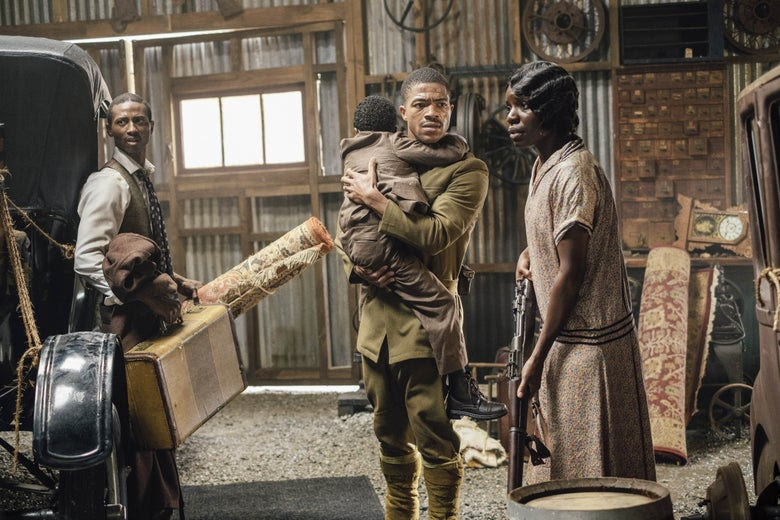
Tulsa Massacre, aired on HBO’S Watchmen, “Sunday night” was something I thought I’d never see on television: the depiction of a dark day in American history that not many know about—the Tulsa massacre.
Late in the afternoon of May 30, 1921, Dick Rowland needed to use the bathroom. A 19-year-old black shoe-shiner working in segregated Oklahoma, he could only use the restroom for coloreds at the top of the Drexel building in downtown Tulsa. To get there, he had to take an elevator operated by Sarah Page, a 17-year-old white teenager.
While there are conflicting reports about what happened in the elevator, what we do know is that on May 30, 1921, a clothing store clerk on the building’s first floor heard what he thought was a woman screaming. Not long after, the building’s elevator doors opened and Rowland quickly exited, looking flustered. Page, behind him, appeared to be in a state of distress. Assuming that Page had been sexually assaulted by Rowland, the clerk called the police, thus setting in motion a chain of events that would devastate the black citizens of Tulsa. Over the next 14 hours, 35 city blocks in Tulsa’s black neighborhoods were burned, an estimated 800 people were injured, and hundreds were killed.
I’m a black man from Oklahoma, and the reason I know that history is because my family members have told it to me since I was a child. A cousin was murdered during those evil hours, and to keep his memory alive, they tell the story of what happened in Tulsa because they were never able to find his body. Telling stories about my cousin Bobby is the only way my family was able to honor him because they were kept from burying him properly. Now, as a college professor at Oklahoma State University, I teach that history in my Philosophy of Race classes, and I am always surprised to learn how few students—even those from Tulsa—are aware of what happened 98 years ago in this state we call home. So, I was shocked to see it depicted for the world to see at the beginning of Watchmen.
Like my students, not many Americans were aware of the incident of mass domestic terrorism that the show depicted. Inspired by the questions she was getting, Regina King took to Twitter to inform those with questions that this was, indeed, something that happened.
Seeing so many engaged by what happened in Tulsa in 1921 is a strange feeling. I want the truth to come out. I want us asking hard questions about our shameful racial past, and I think it is important for us to come to terms with how vicious institutional and interpersonal racism is and was. Black people in Tulsa lost almost everything, and then they were told to be silent about the pain they had endured. So the work of uncovering this history is important and necessary—but I have questions about how it is being done.
Alan Moore and Dave Gibbons’ Watchmen was a graphic novel, and what showrunner Damon Lindelof is up to with the 2019 HBO continuation of this story is quite promising. Yet, to start with the Tulsa massacre as a narrative device is an audacious move, and I wonder what a show about superheroes will do with that very real, very painful historical event as its backdrop. The show opens with a look at the race riot through the eyes of a child. The horror is unfolding all around him, but he is not yet able to understand what is happening and why. In the audience, we are unsettled, but not sure what the show will do with the events depicted.
It could trivialize them, disrespecting the people who lost their lives and the thousands who were forced to live with the trauma. It could take them seriously and weave them into the narrative in such a way that shows us how the evil that came before continues to affect us today. Considering what happens in the source material that the showrunners are drawing from, I hope it is the latter.
In the original Watchmen, an event takes place where millions are killed, and the heroes at the center of the narrative must make an important decision: Tell the truth about what happened, or cover it up. They choose the latter. (I won’t say more but I encourage you to read it—it is a sci-fi masterpiece.) I can see Lindelof using the events of the source material to show how it parallels what happened in history. It would be a narrative tightrope to walk, but, if done well, one worthy of the historical events the show depicts. I, for one, will be watching closely.







